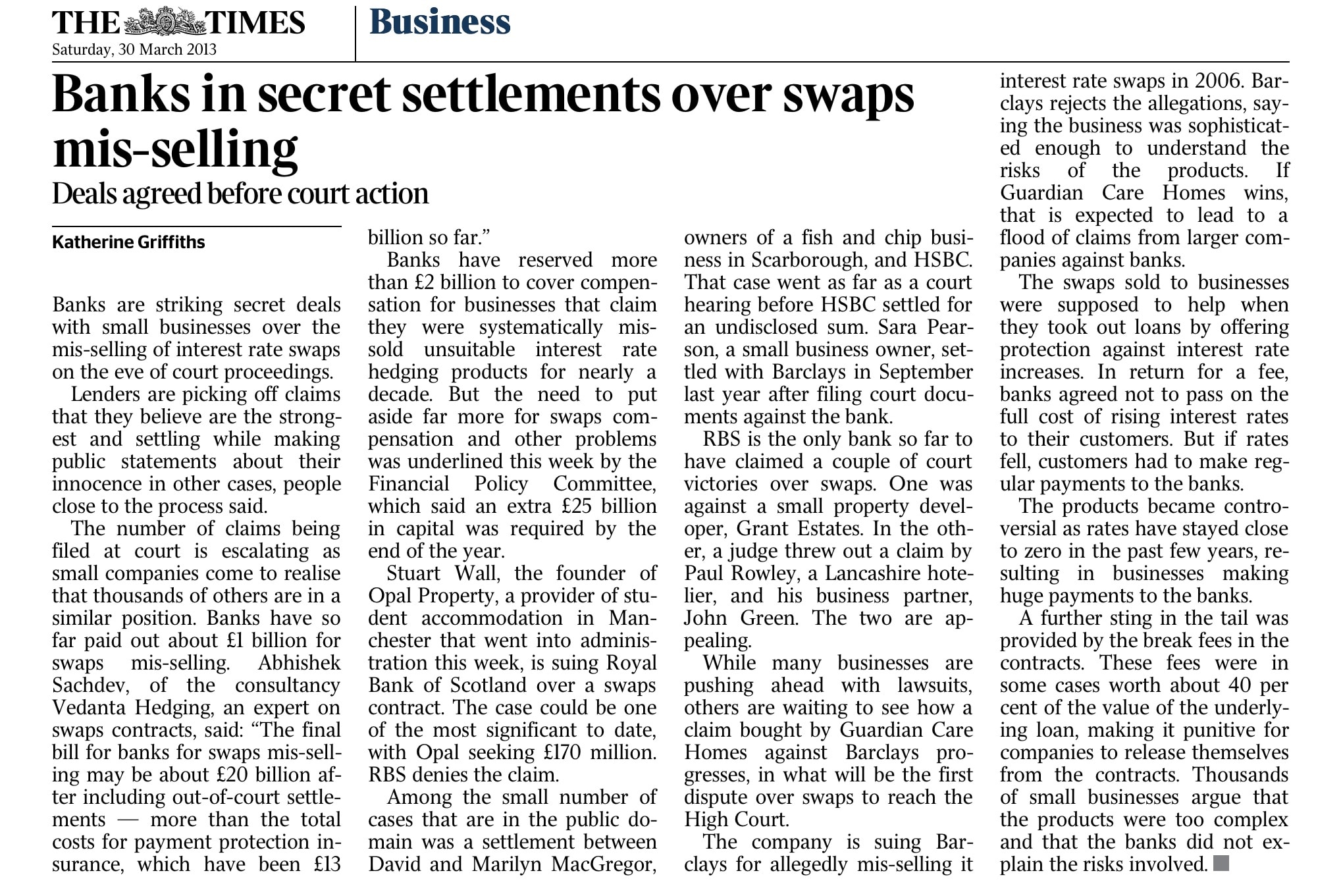The Times Newspaper has been given inside information from a number of reputable sources that banks are striking secret settlement deals with small businesses over the mis-selling of interest rate swaps on the eve of court proceedings. It is clear when bringing suit against the banks that professionally presented and argued ‘good cases’ will lead to settlements whilst ‘bad cases’ will lead to judgments in favour of the banks.
The Times newspaper today reports that lenders are picking off claims that they believe are the strongest and settling while making public statements about their innocence in other cases, people close to the process said.
The number of claims being filed at court is escalating as small companies come to realise that thousands of others are in a similar position. Banks have so far paid out about £1 billion for swaps mis-selling. Abhishek Sachdev, of the consultancy Vedanta Hedging, an expert on swaps contracts, said: “The final bill for banks for swaps mis-selling may be about £20 billion after including out-of-court settlements — more than the total costs for payment protection insurance, which have been £13 billion so far.”
Banks have reserved more than £2 billion to cover compensation for businesses that claim they were systematically mis-sold unsuitable interest rate hedging products for nearly a decade. But the need to put aside far more for swaps compensation and other problems was underlined this week by the Financial Policy Committee, which said an extra £25 billion in capital was required by the end of the year.
Stuart Wall, the founder of Opal Property, a provider of student accommodation in Manchester that went into administration this week, is suing Royal Bank of Scotland over a swaps contract. The case could be one of the most significant to date, with Opal seeking £170 million. RBS denies the claim.
Among the small number of cases that are in the public domain was a settlement between David and Marilyn MacGregor, owners of a fish and chip business in Scarborough, and HSBC. That case went as far as a court hearing before HSBC settled for an undisclosed sum. Sara Pearson, a small business owner, settled with Barclays in September last year after filing court documents against the bank.
RBS is the only bank so far to have claimed a couple of court victories over swaps. One was against a small property developer, Grant Estates. In the other, a judge threw out a claim by Paul Rowley, a Lancashire hotelier, and his business partner, John Green. The two are appealing.
While many businesses are pushing ahead with lawsuits, others are waiting to see how a claim bought by Guardian Care Homes against Barclays progresses, in what will be the first dispute over swaps to reach the High Court.
The company is suing Barclays for allegedly mis-selling it interest rate swaps in 2006. Barclays rejects the allegations, saying the business was sophisticated enough to understand the risks of the products. If Guardian Care Homes wins, that is expected to lead to a flood of claims from larger companies against banks.
The swaps sold to businesses were supposed to help when they took out loans by offering protection against interest rate increases. In return for a fee, banks agreed not to pass on the full cost of rising interest rates to their customers. But if rates fell, customers had to make regular payments to the banks.
The products became controversial as rates have stayed close to zero in the past few years, resulting in businesses making huge payments to the banks.
A further sting in the tail was provided by the break fees in the contracts. These fees were in some cases worth about 40 per cent of the value of the underlying loan, making it punitive for companies to release themselves from the contracts. Thousands of small businesses argue that the products were too complex and that the banks did not explain the risks involved.
Small business that have suffered as victims of swaps mis-selling are encouraged to consider their legal options immediately – good cases lead to settlement and experienced swaps mis-selling law firms can put forward good cases in the right manner with the right legal team to encourage early settlement.

